 MyDogBreeds
MyDogBreeds Icelandic Sheepdog is originated from Iceland but Abruzzenhund is originated from Italy. Icelandic Sheepdog may grow 28 cm / 11 inches shorter than Abruzzenhund. Icelandic Sheepdog may weigh 31 kg / 68 pounds lesser than Abruzzenhund. Both Icelandic Sheepdog and Abruzzenhund has almost same life span. Both Icelandic Sheepdog and Abruzzenhund has almost same litter size. Both Icelandic Sheepdog and Abruzzenhund requires Moderate maintenance.
Icelandic Sheepdog is originated from Iceland but Abruzzenhund is originated from Italy. Icelandic Sheepdog may grow 28 cm / 11 inches shorter than Abruzzenhund. Icelandic Sheepdog may weigh 31 kg / 68 pounds lesser than Abruzzenhund. Both Icelandic Sheepdog and Abruzzenhund has almost same life span. Both Icelandic Sheepdog and Abruzzenhund has almost same litter size. Both Icelandic Sheepdog and Abruzzenhund requires Moderate maintenance.
 There are quite a few different dog breeds that fall under the name of Spitz-type dogs, and in fact they have a number of similar characteristics, one of which is that they have some wolf-like features. They typically have the thick coat with undercoat and the erect, pointed ears and slanted eyes.
There are quite a few different dog breeds that fall under the name of Spitz-type dogs, and in fact they have a number of similar characteristics, one of which is that they have some wolf-like features. They typically have the thick coat with undercoat and the erect, pointed ears and slanted eyes.
There is definitely a strong link between the Spitz type dogs and wild wolves. The tail too is feathery and can curl over the back of the dog.
The Icelandic Sheepdog, a native dog to Iceland, is a Spitz type dog which originates from the dogs brought to Iceland by the Vikings. The dogs have always been used to herd sheep, and they resemble dogs found in graves in Sweden and Denmark.
The dog at one time was facing extinction in the late 20th century, but in 1969, the Icelandic Dog Breeder Association was established to restore and preserve the breed. The Icelandic Sheepdog gained AKC recognition in June 2010.
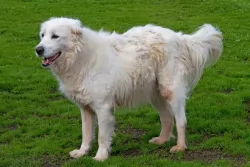 Abruzzenhund was established as an individual breed in the middle of the 20th century. They are descendant of the big, white Eastern sheepdogs which came to Europe 2000 years ago. Abruzzenhund is a mix of Turkish sheepdogs Akbash and Karabash, the Kuvac, Slovakian breed Hungarian breed, Komondor, and a French sheepdog Pyrenean Mountain Dog. Those dogs were much bigger than today’s breed. Abruzzenhund is still not very popular breed, but it is very common in Great Britain and Italy. They have been used as guard dogs, hunting dogs, and working dogs because they are very brave and strong.
Abruzzenhund was established as an individual breed in the middle of the 20th century. They are descendant of the big, white Eastern sheepdogs which came to Europe 2000 years ago. Abruzzenhund is a mix of Turkish sheepdogs Akbash and Karabash, the Kuvac, Slovakian breed Hungarian breed, Komondor, and a French sheepdog Pyrenean Mountain Dog. Those dogs were much bigger than today’s breed. Abruzzenhund is still not very popular breed, but it is very common in Great Britain and Italy. They have been used as guard dogs, hunting dogs, and working dogs because they are very brave and strong.
 The Icelandic Sheepdog is a smallish to medium sized dog standing at 40 to 45cm in height and he can weigh anything between 9 and 14kg.
The Icelandic Sheepdog is a smallish to medium sized dog standing at 40 to 45cm in height and he can weigh anything between 9 and 14kg.
His double coat can be short or long, straight or wavy and in a mix of colors such as grey and white or tan and white, black, tan and white, cream or chocolate. Even though they come in a number of predominant colors, these colors are always accompanied by white markings.
He has a longish muzzle, much like the wolf, giving him an alert, foxy appearance. He has a muscular, rectangular body with strong, straight legs with dewclaws on both the front and hind legs.
Your social, energetic dog will require socialization and training which does him the world of good, turning him into a well-adjusted, obedient dog.
He is an intelligent dog, and training him won't be difficult as he is eager to please. These are social dogs which love being part of the family and they don't like being left outside day after day with little human intervention. He is a lively, confident breed, gentle and not at all aggressive.
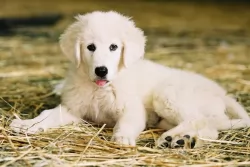 A height of Abruzzenhund variates between 60-73 cm, males are slightly bigger than females. While the weight is 30-45kg, again, males are heavier than females.
A height of Abruzzenhund variates between 60-73 cm, males are slightly bigger than females. While the weight is 30-45kg, again, males are heavier than females.
Abruzzenhund lifespan is between 11-13 years, but since these dogs don’t have any weaknesses and don’t tend to get sick, they can live longer with a proper care and adequate food and training.
Litter size of Abruzzenhund depends, but as any large breed, they usually have 6-9 puppies. And that is a very good considering size of the breed.
Abruzzenhund is not the only name of this breed. There are more names that you might hear. You can hear names like Maremma, Pastore, Abruzzese, Cane da Pastore, Maremmano- Abruzzese, Italian Sheepdog, and many similar names. Basically, they sound similar but there are differences.
Abruzzenhund is a friendly dog, but it is very powerful. Very strong jaw with a scissors bite makes them very strong. They have small but intelligent eyes, usually dark colored. The undercoat is dense, while the coat is white with segments of ivory to white yellow. Their long undercoat and coat make them winter resistant.
 The Icelandic Sheepdog is such a good all-round family pet. He is alert, intelligent, social, playful, loyal, loving and brave.
The Icelandic Sheepdog is such a good all-round family pet. He is alert, intelligent, social, playful, loyal, loving and brave.
He is friendly too, getting on well with children and any pets you have in the home. He is essentially a working dog, so you shouldn’t think of owning him as a pet if your lifestyle is centered around the TV and the couch for the best part of the day.
This is an energetic dog who wants lots of action during the day. He is a dog that badly wants to be part of the family and in exchange for looking after him well, he’ll promise to be an exceptional pet.
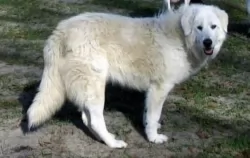 Abruzzenhund is a very well-balanced breed who loves spending time with other animals and people. They have a very good temper. They love being around families, and they are very gentle with children. It is important to train Abruzzenhund properly because the dog of that size should be a leader. A human with a strong character should train this breed. Training is important because they tend to make their own decisions which can be bad sometimes.
Abruzzenhund is a very well-balanced breed who loves spending time with other animals and people. They have a very good temper. They love being around families, and they are very gentle with children. It is important to train Abruzzenhund properly because the dog of that size should be a leader. A human with a strong character should train this breed. Training is important because they tend to make their own decisions which can be bad sometimes.
 Your pet will reach 12 to 14 years of age with good care and is regarded as a generally healthy dog breed. However, they can be prone to a few health conditions, and these include hip dysplasia and diabetes.
Your pet will reach 12 to 14 years of age with good care and is regarded as a generally healthy dog breed. However, they can be prone to a few health conditions, and these include hip dysplasia and diabetes.
Mercifully for your pet, diabetes is considered a manageable disorder. When your pet doesn’t produce insulin or can’t utilize it normally, his blood sugar levels rise, resulting in hyperglycemia.
If left untreated, your pet can land up with a host of complicated health problems. Diabetes can be classified as either Type 1 or Type II, with the more common form in dogs being Type 1.
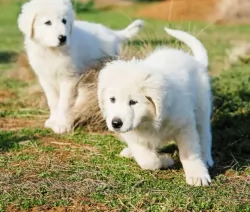 A great thing about Abruzzenhund is that they are very healthy dogs. They don’t have any chronical health problems, so if you are feeding your dog properly, with a lot of exercises they will not have any health problems. It is also important to check genetics of the dog.
A great thing about Abruzzenhund is that they are very healthy dogs. They don’t have any chronical health problems, so if you are feeding your dog properly, with a lot of exercises they will not have any health problems. It is also important to check genetics of the dog.
 Feed your energetic Icelandic Sheepdog a diet which is appropriate for his age and activity level. Don't just feed him the best commercially manufactured dog food, but give him some cooked chicken, brown rice and vegetables mixed into his kibble as a tasty treat. Also, dogs are carnivores, so include some raw meat into his diet from time to time. Clean, cool water should always be available.
Feed your energetic Icelandic Sheepdog a diet which is appropriate for his age and activity level. Don't just feed him the best commercially manufactured dog food, but give him some cooked chicken, brown rice and vegetables mixed into his kibble as a tasty treat. Also, dogs are carnivores, so include some raw meat into his diet from time to time. Clean, cool water should always be available.
The Icelandic Sheepdog has a thick double coat, with the outer coat being longer and the hair being shiny and glossy. These dogs shed quite a bit with seasonal shedding too so twice-weekly brushing will be necessary to keep the fur free of loose hair. His nails should also be checked regularly and his teeth should be brushed a couple of times a week too.
Icelandic Sheepdogs are athletic, active dogs that require a lot of exercise to keep them in good physical shape.
He loves all kinds of games and outdoor activities, one of which will be going with you for a walk every day. He makes a wonderful companion for those people going on long hikes.
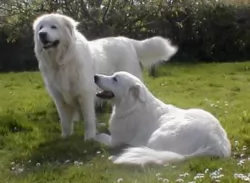 They learn very quickly, but it requires strong will and constant training to keep them happy. They are great working dogs, and with the positive training, they are amazing. It is very important that they follow rules and to keep them in balance with training.
They learn very quickly, but it requires strong will and constant training to keep them happy. They are great working dogs, and with the positive training, they are amazing. It is very important that they follow rules and to keep them in balance with training.
They can eat a lot of food, depend on their activity. High-Quality dog food twice a day for a grown dog is a must. While puppies should eat 3-5 times, smaller portions of food. The food is important especially for working dogs, they need up to 2000-3000Kcal per day. Abruzzenhund will enjoy eating meat with a lot of vegetables and oil.
They are not recommended for small house or apartment. They need big yard because they require a lot of space. During the winter they can be outside because of their coat, but during the summer they need to be in the shade with a lot of fresh water available anytime.
The coat should be brushed and groomed very often because they have a thick coat. There is a lot of dead and loose hair in it. During shedding, period takes even more time to groom your dog properly. They love and they need exercise. Mental exercise is important as physical. Every day walking, running, playing with other animals is an important part of dog's activity. When they get enough quality exercise, they will sleep in the house.